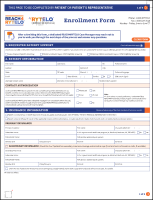What is RYTELO?
- with anemia (low red blood cell counts) who need blood transfusions of 4 or more red blood cell units over 8 weeks
and
- who have not responded to, have stopped responding to, or cannot be treated with medicines called erythropoiesis-stimulating agents (ESAs).
It is not known if RYTELO is safe and effective in children.
What support and resources does RYTELO offer?

REACH4RYTELO Patient Support Program
The REACH4RYTELO Patient Support Program can help patients who have been prescribed RYTELO navigate access and coverage.*
Benefits Investigation: support during the process of determining your insurance benefits for RYTELO and eligibility for affordability programs
Prior Authorization (PA): provide information relevant to navigating the PA approval process from your insurance company
Appeals Support: provide information relevant to navigating appeals of any denied PA requests
*The accurate completion of reimbursement- or coverage-related documentation is the responsibility of the healthcare provider and patient. REACH4RYTELO and its agents make no guarantee regarding coverage and reimbursement for RYTELO.
Once you have been enrolled in REACH4RYTELO and a benefits investigation has been conducted, your doctor will receive a summary of the results of the benefits investigation.* If information is missing, a Case Manager will follow up with your doctor.
Your doctor should respond promptly to a request for further information from a Case Manager to avoid any delays.
The Copay Program
For eligible, commercially insured patients, the REACH4RYTELO Copay Program offers savings up to $10,650 per calendar year.† There are no income requirements to participate in the program. Terms and conditions apply.
If eligible, you may pay as little as $0 out-of-pocket for RYTELO, which includes copay and coinsurance, up to $9450 annually.
If eligible, you may save up to $100 per infusion, up to $1200 annually. Itemized explanation of benefits (EOBs) must have separate line for out-of-pocket cost of administration.
†The REACH4RYTELO Copay Program is not available to patients with any form of government insurance (such as Medicaid, Medicare, TRICARE, and VA). Patients must meet certain eligibility criteria to qualify for this program, including requirements related to the diagnosis for which the patient is receiving treatment and the patient’s insurance status. To enroll in the Copay Program, patients must first enroll in REACH4RYTELO. If eligible for the Copay Program, the patient may pay as little as $0 out-of-pocket for RYTELO with a maximum benefit of $9450 per year for the cost of the drug and a maximum benefit of $1200 per year for the cost of administration (up to $100 per infusion). An itemized EOB must be provided with a separate line for the out-of-pocket cost of administration fee. Residents of MA, MI, MN, and RI are not eligible to receive copay assistance for product administration and are therefore only eligible for a maximum benefit of $9450 per year for the cost of the drug. For Copay Program eligibility questions, contact a representative from REACH4RYTELO at 1-844-479-8356.
All programs provided through REACH4RYTELO are subject to eligibility requirements. Geron reserves the right to modify or discontinue REACH4RYTELO at any time without notice.
About the REACH4RYTELO Copay Program
If your healthcare provider determines RYTELO is right for you, you can work with your healthcare provider to complete and submit an enrollment form. If you think you may be eligible, talk to your healthcare provider or call REACH4RYTELO at 1-844-4RYTELO (1-844-479-8356) and ask about the enrollment process.
What is RYTELO?
RYTELO (imetelstat) is a prescription medicine used to treat a condition called low- to intermediate-1 risk myelodysplastic syndromes (MDS) in adults:
- with anemia (low red blood cell counts) who need blood transfusions of 4 or more red blood cell units over 8 weeks
and
-
who have not responded to, have stopped responding to, or cannot be treated with medicines called erythropoiesis-stimulating agents (ESAs).
It is not known if RYTELO is safe and effective in children.
Important Safety Information
Before you receive RYTELO (imetelstat), tell your healthcare provider about all of your medical conditions, including if you:
-
are pregnant or plan to become pregnant. RYTELO may harm your unborn baby and may cause loss of pregnancy (miscarriage). Tell your healthcare provider right away if you become pregnant or think you may be pregnant during treatment with RYTELO.
Females who are able to become pregnant:
- Your healthcare provider will perform a pregnancy test before you are given RYTELO.
- You should use effective birth control (contraception) during treatment with RYTELO and for 1 week after your last dose.
- are breastfeeding or plan to breastfeed. It is not known if RYTELO passes into your breastmilk. Do not breastfeed during treatment with RYTELO and for 1 week after your last dose.
Tell your healthcare provider about all the medicines you take, including prescription and over-the-counter medicines, vitamins, and herbal supplements.
What is the most important information I should know about RYTELO?
RYTELO may cause serious side effects, including:
-
Low platelet counts (thrombocytopenia). Low platelet counts are common during treatment with RYTELO and can also be severe. Low platelet counts can increase your risk for bleeding. Your healthcare provider may give you platelet transfusions to reduce the risk of bleeding if you develop a low platelet count during treatment with RYTELO. Tell your healthcare provider right away if you develop any signs or symptoms of bleeding, including:
- unusual bleeding or bruising
- bleeding that lasts a long time
- nosebleeds
- vomiting blood
- blood in your stool or black tarry stool
-
Low neutrophil counts (neutropenia). Low counts of a type of white blood cell called neutrophils are common during treatment with RYTELO and can also be severe. Low neutrophil counts can increase your risk for infections, including serious infections and sepsis. Your healthcare provider may give you medicines before you start treatment to help prevent neutropenia and infections and may treat you with medicines if you develop these problems during treatment with RYTELO. Tell your healthcare provider right away if you develop any signs or symptoms of infection during treatment with RYTELO, including:
- fever
- shortness of breath or trouble breathing
- cough
- chills
- pain or burning when you urinate
Your healthcare provider will do blood tests to check your platelet and neutrophil counts before starting treatment with RYTELO, weekly for the first 2 cycles of treatment, before you receive each additional cycle, and as needed during your treatment.
Your healthcare provider may delay your next treatment, decrease your dose, or stop treatment with RYTELO if you develop thrombocytopenia or neutropenia during treatment.
What are the possible side effects of RYTELO?
RYTELO may cause serious side effects, including:
- See “What is the most important information I should know about RYTELO?”
-
Infusion-related reactions. RYTELO can cause infusion-related reactions during or after your infusion that can be severe, including a severe sudden increase in blood pressure called hypertensive crisis. Your healthcare provider will give you medicines before each RYTELO infusion to help prevent or lessen infusion-related reactions and will watch you for at least 1 hour after your infusion. If you develop infusion-related reactions, your healthcare provider may infuse RYTELO more slowly, temporarily stop, or permanently stop your treatment. Tell your healthcare provider if you develop any signs or symptoms of infusion-related reactions, including:
- stomach pain
- joint pain
- weakness and tiredness
- back and bone pain
- diarrhea
- redness
- headache
- high blood pressure
- not feeling well
- chest pain that is not related to your heart
- itching
- hives
The most common side effects of RYTELO include:
- decreased platelet counts
- decreased white blood cell counts
- decreased neutrophil counts
- increased liver enzymes (AST, alkaline phosphatase, and ALT)
- tiredness
- longer than usual blood clotting times
- joint, bone and muscle pain
- Covid-19 infections
- headache
These are not all of the possible side effects of RYTELO. Call your doctor for more information and medical advice about side effects. You are encouraged to report negative side effects of prescription drugs to the FDA. Visit www.fda.gov/MedWatch or call 1-800-FDA-1088.
Please see RYTELO (imetelstat) full Prescribing Information, including Medication Guide.
Important Safety Information
Before you receive RYTELO (imetelstat), tell your healthcare provider about all of your medical conditions, including if you:
-
are pregnant or plan to become pregnant. RYTELO may harm your unborn baby and may cause loss of pregnancy (miscarriage). Tell your healthcare provider right away if you become pregnant or think you may be pregnant during treatment with RYTELO.
Females who are able to become pregnant:
- Your healthcare provider will perform a pregnancy test before you are given RYTELO.
- You should use effective birth control (contraception) during treatment with RYTELO and for 1 week after your last dose.
- are breastfeeding or plan to breastfeed. It is not known if RYTELO passes into your breastmilk. Do not breastfeed during treatment with RYTELO and for 1 week after your last dose.
Tell your healthcare provider about all the medicines you take, including prescription and over-the-counter medicines, vitamins, and herbal supplements.
What is the most important information I should know about RYTELO?
RYTELO may cause serious side effects, including:
-
Low platelet counts (thrombocytopenia). Low platelet counts are common during treatment with RYTELO and can also be severe. Low platelet counts can increase your risk for bleeding. Your healthcare provider may give you platelet transfusions to reduce the risk of bleeding if you develop a low platelet count during treatment with RYTELO. Tell your healthcare provider right away if you develop any signs or symptoms of bleeding, including:
- unusual bleeding or bruising
- bleeding that lasts a long time
- nosebleeds
- vomiting blood
- blood in your stool or black tarry stool
-
Low neutrophil counts (neutropenia). Low counts of a type of white blood cell called neutrophils are common during treatment with RYTELO and can also be severe. Low neutrophil counts can increase your risk for infections, including serious infections and sepsis. Your healthcare provider may give you medicines before you start treatment to help prevent neutropenia and infections and may treat you with medicines if you develop these problems during treatment with RYTELO. Tell your healthcare provider right away if you develop any signs or symptoms of infection during treatment with RYTELO, including:
- fever
- shortness of breath or trouble breathing
- cough
- chills
- pain or burning when you urinate
Your healthcare provider will do blood tests to check your platelet and neutrophil counts before starting treatment with RYTELO, weekly for the first 2 cycles of treatment, before you receive each additional cycle, and as needed during your treatment.
Your healthcare provider may delay your next treatment, decrease your dose, or stop treatment with RYTELO if you develop thrombocytopenia or neutropenia during treatment.
What are the possible side effects of RYTELO?
RYTELO may cause serious side effects, including:
- See “What is the most important information I should know about RYTELO?”
-
Infusion-related reactions. RYTELO can cause infusion-related reactions during or after your infusion that can be severe, including a severe sudden increase in blood pressure called hypertensive crisis. Your healthcare provider will give you medicines before each RYTELO infusion to help prevent or lessen infusion-related reactions and will watch you for at least 1 hour after your infusion. If you develop infusion-related reactions, your healthcare provider may infuse RYTELO more slowly, temporarily stop, or permanently stop your treatment. Tell your healthcare provider if you develop any signs or symptoms of infusion-related reactions, including:
- stomach pain
- joint pain
- weakness and tiredness
- back and bone pain
- diarrhea
- redness
- headache
- high blood pressure
- not feeling well
- chest pain that is not related to your heart
- itching
- hives
The most common side effects of RYTELO include:
- decreased platelet counts
- decreased white blood cell counts
- decreased neutrophil counts
- increased liver enzymes (AST, alkaline phosphatase, and ALT)
- tiredness
- longer than usual blood clotting times
- joint, bone and muscle pain
- Covid-19 infections
- headache
These are not all of the possible side effects of RYTELO. Call your doctor for more information and medical advice about side effects. You are encouraged to report negative side effects of prescription drugs to the FDA. Visit www.fda.gov/MedWatch or call 1-800-FDA-1088.
Please see RYTELO (imetelstat) full Prescribing Information, including Medication Guide.
What is RYTELO?
RYTELO (imetelstat) is a prescription medicine used to treat a condition called low- to intermediate-1 risk myelodysplastic syndromes (MDS) in adults:
- with anemia (low red blood cell counts) who need blood transfusions of 4 or more red blood cell units over 8 weeks
and
-
who have not responded to, have stopped responding to, or cannot be treated with medicines called erythropoiesis-stimulating agents (ESAs).
It is not known if RYTELO is safe and effective in children.


